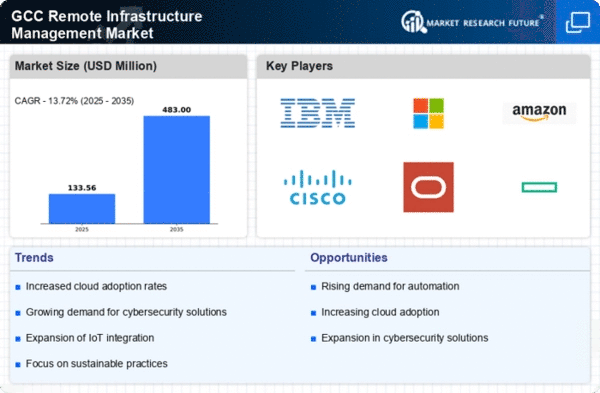Growing Demand for Cost Efficiency
The Remote Infrastructure Management Market is experiencing a notable surge in demand for cost efficiency among organizations in the GCC. Companies are increasingly seeking solutions that minimize operational costs while maximizing productivity. This trend is driven by the need to allocate resources more effectively, especially in a competitive economic landscape. According to recent data, businesses that implement remote infrastructure management solutions can reduce their IT operational costs by up to 30%. This financial incentive is compelling, as organizations aim to streamline their processes and enhance their return on investment. As a result, the market is likely to witness a continuous influx of innovative solutions designed to meet these cost-saving objectives.
Advancements in Network Infrastructure
Technological advancements in network infrastructure are playing a pivotal role in shaping the Remote Infrastructure Management Market. The proliferation of high-speed internet and the deployment of 5G technology in the GCC are enabling organizations to adopt more sophisticated remote management solutions. These advancements facilitate real-time monitoring and control of infrastructure, enhancing overall operational efficiency. As a result, businesses are increasingly investing in remote management tools that leverage these technologies. The market is projected to grow as organizations seek to capitalize on improved connectivity and performance, which are essential for effective infrastructure management.
Rising Focus on Operational Resilience
In the context of the Remote Infrastructure Management Market, there is a growing emphasis on operational resilience among GCC enterprises. Organizations are increasingly aware of the need to maintain uninterrupted services and ensure business continuity in the face of potential disruptions. This focus is reflected in the adoption of remote management tools that enhance system reliability and performance. Data indicates that companies investing in such solutions can achieve a 25% improvement in service uptime. As businesses strive to adapt to changing market conditions, the demand for robust infrastructure management solutions is expected to rise, further propelling the growth of the market.
Shift Towards Hybrid Work Environments
The Remote Infrastructure Management Market is witnessing a shift towards hybrid work environments, which is reshaping how organizations manage their IT infrastructure. As companies in the GCC adopt flexible work models, there is a growing need for solutions that support remote access and collaboration. This trend is driving the demand for remote management tools that ensure secure and efficient operations across diverse work settings. Data suggests that organizations implementing hybrid work strategies can enhance employee productivity by up to 20%. Consequently, the market is likely to expand as businesses seek to optimize their infrastructure management in alignment with evolving work dynamics.
Increased Regulatory Compliance Requirements
The Remote Infrastructure Management Market is significantly influenced by the increasing regulatory compliance requirements in the GCC region. Organizations are compelled to adhere to stringent regulations concerning data protection, privacy, and operational standards. This has led to a heightened demand for remote management solutions that facilitate compliance monitoring and reporting. Companies that leverage these solutions can potentially reduce compliance-related risks by up to 40%. As regulatory frameworks continue to evolve, the market is likely to expand, driven by the necessity for businesses to align their operations with legal mandates while ensuring efficient infrastructure management.
















